★★★
“Should have paid more attention in history class.”
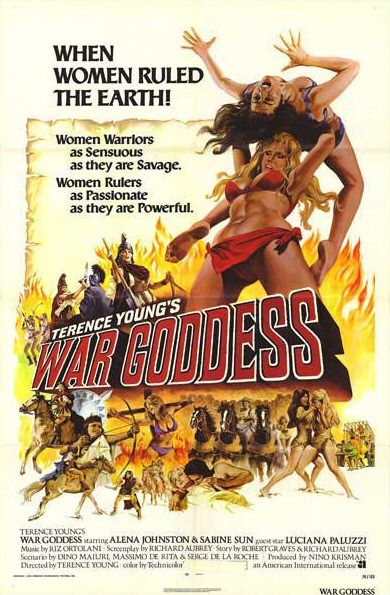 The Amazons are a tribe of women, who have seceded from the rest of the world, and set up a state purely composed of their own sex. For reproductive purposes, there’s an annual get-together with men – preceded by exercises to prevent any feelings except for abhorrence – and every four years, contests (javelin throwing, running, archery, etc.) to choose the queen. Which is where we come in, with blonde Antiope (Johnston) defeating brunette Oreitheia (Sun). The new ruler believes the tribe have gone soft, and also wants a return to a more egalitarian society; this doesn’t sit well with Oreitheia, or a lot of the other high Amazons, and a coup d’etat is soon being planned. Meanwhile, the annual Bonkapalooza poses problems of its own, as Antiope finds herself with feelings for Greek king Theseus (Infanti), who in turn feels guilty about having inadvertently sent the tribe into a Scythian ambush.
The Amazons are a tribe of women, who have seceded from the rest of the world, and set up a state purely composed of their own sex. For reproductive purposes, there’s an annual get-together with men – preceded by exercises to prevent any feelings except for abhorrence – and every four years, contests (javelin throwing, running, archery, etc.) to choose the queen. Which is where we come in, with blonde Antiope (Johnston) defeating brunette Oreitheia (Sun). The new ruler believes the tribe have gone soft, and also wants a return to a more egalitarian society; this doesn’t sit well with Oreitheia, or a lot of the other high Amazons, and a coup d’etat is soon being planned. Meanwhile, the annual Bonkapalooza poses problems of its own, as Antiope finds herself with feelings for Greek king Theseus (Infanti), who in turn feels guilty about having inadvertently sent the tribe into a Scythian ambush.
I don’t think I’ve often been so confused by a film’s approach, but this is so uneven in tone, I had to watch twice to get any kind of handle on it. For example, it starts with a jokey set of captions about how this maybe didn’t really happen, then swings in to the competition to be queen, peaking in seriousness with Antiope’s “pipe bomb” speech post-inauguration, which is radical to the point of almost revolutionary. But before you know it, you’re back to sub-Benny Hill antics involving bawdy comedy, or interpretive dance. This roller-coaster ride has Antiope apparently going from conception to birth in what feels like three days, without ever passing through pregnancy. It ends in a massive disappointment, which sees Antiope transformed from a warrior queen into little more than a simpering underling to Theseus, concerned that she might have to ask him for money to buy new sandals. Guess the sex war is over, guys – and we won. Woo-hoo!
Not to say there isn’t plenty here to enjoy, because it’s clear a lot of work went into this, and there’s no shortage of spectacle. Okay, some of it was work you might not have minded. According to Raw Panic, “Director Terence Young and colleagues reviewed 14,000 photographs and conducted “Miss Amazon” contests in Trieste, Paris, Hamburg, Munich, Rome and Nice to come up with the 100 women who are the Amazons.” Hey, it’s a dirty job, but someone’s got to do it… Those selected, “then endured a six-week training regimen that included riding, calisthenics and running from early in the morning until lights out. They did mostly their own stunts too; several girls had broken legs and one lost a finger under a chariot wheel.” If the results are somewhat uneven – some still look unsure about which end of a sword is which – most of the featured actresses are competent enough. Young is probably best known for his role in kick-starting the 007 franchise, directing both Dr. No and From Russia With Love – I was certainly reminded of the classic “gypsy camp catfight” sequence from the latter by a couple of moments here.
Yeah, if there are two scenes you’ll remember, it’s the brawls between Antiope and Oreitheia. The first is to decide who wears the crown, and involves the pre-fight application of “holy oil,” one suspects more for aesthetic than ecclesiastical considerations. The second is when Oreitheia’s midnight assassination attempt is uncovered, and appears to exist in two versions: one bikini-clad, the other entirely nude, depending on the market. You can catch a glimpse of the former in the trailer below; the less-encumbered, NSFW version can be seen in the Italian promo. Go ahead. We’ll wait for you here. :) There. Wasn’t that fun? Credit is due to both Johnston and Sun, who take on material that often strays to questionable or even laughable, with a straight-faced intensity which is rather more than it deserves. It’s a shame that some of the others involved, on the other side of the camera, weren’t apparently willing to take this as seriously.
Dir: Terence Young
Star: Alena Johnston, Angelo Infanti, Sabine Sun, Rosanna Yanni
a.k.a. Le guerriere dal seno nudo
a.k.a. The Amazons





 Nami (Kaji) is about to get married, but her wedding day is rudely interrupted by the arrival of the cops, who arrest her. On the way to prison (and, unsurprisingly, death row, given the body count left behind in the previous three movies), she takes out the driver, causing a crash. The injured Scorpion staggers away, and is rescued by Kudo (Tamura), a former political radical who was brutalized by the police for his actions, and so has a massive load of resentment against them. After being informed of Kudo’s harbouring of Nami by a worked at the sex-club where he works, the cops take him in: and use both physical and psychological torture to try and make him give up her location. Eventually arrested, Nami is sentenced to death, but the cops intend to make sure the time leading up to her execution is as unpleasant and possible, and the detective in charge, Hirose (Tsukata), is intent on making even Nami’s death as lonely an experience as possible.
Nami (Kaji) is about to get married, but her wedding day is rudely interrupted by the arrival of the cops, who arrest her. On the way to prison (and, unsurprisingly, death row, given the body count left behind in the previous three movies), she takes out the driver, causing a crash. The injured Scorpion staggers away, and is rescued by Kudo (Tamura), a former political radical who was brutalized by the police for his actions, and so has a massive load of resentment against them. After being informed of Kudo’s harbouring of Nami by a worked at the sex-club where he works, the cops take him in: and use both physical and psychological torture to try and make him give up her location. Eventually arrested, Nami is sentenced to death, but the cops intend to make sure the time leading up to her execution is as unpleasant and possible, and the detective in charge, Hirose (Tsukata), is intent on making even Nami’s death as lonely an experience as possible. When this begins, Nami (Kaji) is on the run, and slices the arm off Detective Kondo (Narita) after he handcuffs himself to her. She befriends street hooker Yuki (Watanabe), who runs foul of the locak Yakuza gang by turning tricks on their turn, while trying to care for her brain-damaged brother, whom she also services sexually, to stop him from raping women(!). After Nami is involved in the death of a gang member who was blackmailing her, the gang’s madam Katsu (Lee), who knew the Scorpion from her own prison days, captures her, locking our heroine up in a literal big bird-cage. But after the true horror of the Yakuza’s treatment of their women is revealed (it starts with a golf-club going where no golf-club should ever go), Nami escapes and carves a bloody path of revenge on those responsible. When Katsu realizes what’s going on, she turns herself in to the police, figuring jail will be safe from Sasori’s wrath. Take a wild stab in the dark… Which, by coincidence is exactly what Katsu deserves.
When this begins, Nami (Kaji) is on the run, and slices the arm off Detective Kondo (Narita) after he handcuffs himself to her. She befriends street hooker Yuki (Watanabe), who runs foul of the locak Yakuza gang by turning tricks on their turn, while trying to care for her brain-damaged brother, whom she also services sexually, to stop him from raping women(!). After Nami is involved in the death of a gang member who was blackmailing her, the gang’s madam Katsu (Lee), who knew the Scorpion from her own prison days, captures her, locking our heroine up in a literal big bird-cage. But after the true horror of the Yakuza’s treatment of their women is revealed (it starts with a golf-club going where no golf-club should ever go), Nami escapes and carves a bloody path of revenge on those responsible. When Katsu realizes what’s going on, she turns herself in to the police, figuring jail will be safe from Sasori’s wrath. Take a wild stab in the dark… Which, by coincidence is exactly what Katsu deserves.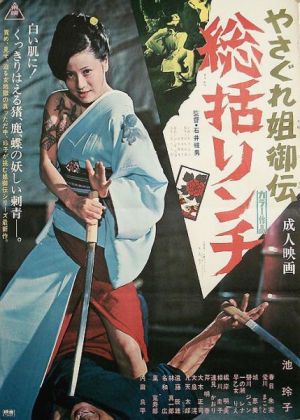 This starts with a memorable sequence in which Inoshika Ocho (Ike) fights off a number of attackers, armed only with her umbrella; albeit, an umbrella that is rather more heavily-armed than most. While she succeeds, she ends up losing all of her clothes in the process, leading to some artful staging in which the discarded umbrella is used to hide her naughties bits. Unfortunately, the rest of the film, while occasionally reaching the same levels of unsanity is largely crude and unpleasant. Even the central concept – a gang smuggling drugs in the vaginas of junkies – falls firmly into that category.
This starts with a memorable sequence in which Inoshika Ocho (Ike) fights off a number of attackers, armed only with her umbrella; albeit, an umbrella that is rather more heavily-armed than most. While she succeeds, she ends up losing all of her clothes in the process, leading to some artful staging in which the discarded umbrella is used to hide her naughties bits. Unfortunately, the rest of the film, while occasionally reaching the same levels of unsanity is largely crude and unpleasant. Even the central concept – a gang smuggling drugs in the vaginas of junkies – falls firmly into that category. Serial escaper Ruriko (Sugimoto) is more persistent than good, and is dragged back to reform school after her seventh escape attempt ends the same way as her previous six. After whizzing through most of the standards of the women-in-prison genre in about 30 minutes or so e.g. corrupt staff, gratuitous nudity, solitary confinement, etc. she and a few of her colleagues (supposedly teenagers, but that clearly ain’t the case) break out as a group. Splitting up to avoid detection, they arrange a rendezvous at a deserted building by the sea, from where they plan to hijack a ship and escape Japan for good. Truth be told, a sense of urgency isn’t exactly top of the their skill-set, and as they meander their way there, various escapades happen, of which the only significant one is Ruriko meeting, by chance, a male criminal (Watase), who is also trying to out-run the law. But the police are also keen to ensure that they run their record in terms of Ruriko to a perfect 8-for-8…
Serial escaper Ruriko (Sugimoto) is more persistent than good, and is dragged back to reform school after her seventh escape attempt ends the same way as her previous six. After whizzing through most of the standards of the women-in-prison genre in about 30 minutes or so e.g. corrupt staff, gratuitous nudity, solitary confinement, etc. she and a few of her colleagues (supposedly teenagers, but that clearly ain’t the case) break out as a group. Splitting up to avoid detection, they arrange a rendezvous at a deserted building by the sea, from where they plan to hijack a ship and escape Japan for good. Truth be told, a sense of urgency isn’t exactly top of the their skill-set, and as they meander their way there, various escapades happen, of which the only significant one is Ruriko meeting, by chance, a male criminal (Watase), who is also trying to out-run the law. But the police are also keen to ensure that they run their record in terms of Ruriko to a perfect 8-for-8…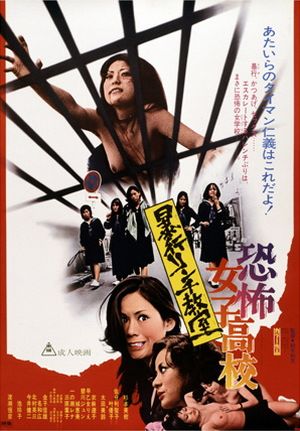
 This was the title that finally ‘broke’ Chris, and she wondered what the hell I was Googling to come across this movie. Shame she missed it, as despite some rather nasty sexual sadism, it’s among the best of the genre. Girl gang leader Noriko (Sugimoto) is assigned to the “School of Hope”, a morally-bankrupt educational establishment for delinquent girls. It’s principal is entirely ineffectual, and it’s actually run by the vice-principal (Imai), with the collaboration of the “Disciplinary Committee,” a group of the girls he allows to dish out punishment. Noriko isn’t going to stand for that, and teams up with a sleazy journalist (Watase) to bring down both the Committee and those in charge.
This was the title that finally ‘broke’ Chris, and she wondered what the hell I was Googling to come across this movie. Shame she missed it, as despite some rather nasty sexual sadism, it’s among the best of the genre. Girl gang leader Noriko (Sugimoto) is assigned to the “School of Hope”, a morally-bankrupt educational establishment for delinquent girls. It’s principal is entirely ineffectual, and it’s actually run by the vice-principal (Imai), with the collaboration of the “Disciplinary Committee,” a group of the girls he allows to dish out punishment. Noriko isn’t going to stand for that, and teams up with a sleazy journalist (Watase) to bring down both the Committee and those in charge.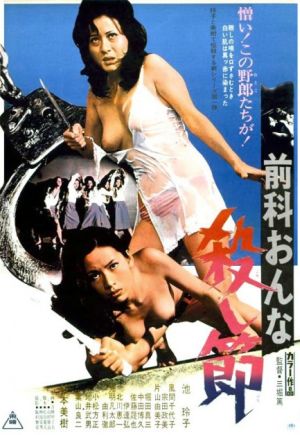 With a bit more of an intricate plot than most entries, this is the tale of revenge served cold. The Oba Yakuza gang shoot one of their flunkies up with drugs and dump his dead body in a ditch. His daughter, Maki (Ike), tries to stab the boss responsible (Hayama) in a nightclub, but she is, frankly, a bit crap with a blade; the attack fails, and she ends up in prison. There, after proving her toughness in a jail “I quit” match, she is accepted by the other girls, including the heavily-tattooed Masayo (Sugimoto). A few years pass, and Maki gets out of jail; her friends are waiting, and they agree to help in her plan for vengeance. This involves Tetsu, the psycho scion of the Hamayasu clan, who used to rule things before the Oba group came in and kicked their asses. Maki will use him as the scapegoat, to trigger war between the groups, then step in to take out Oba once he has been weakened. That’s the plan, anyway, with Maki whoring herself out, to (gasp!) foreigners and even (shock!) a black airman to get resources. However, a large spanner in the works is that Masayo is also Oba’s wife…
With a bit more of an intricate plot than most entries, this is the tale of revenge served cold. The Oba Yakuza gang shoot one of their flunkies up with drugs and dump his dead body in a ditch. His daughter, Maki (Ike), tries to stab the boss responsible (Hayama) in a nightclub, but she is, frankly, a bit crap with a blade; the attack fails, and she ends up in prison. There, after proving her toughness in a jail “I quit” match, she is accepted by the other girls, including the heavily-tattooed Masayo (Sugimoto). A few years pass, and Maki gets out of jail; her friends are waiting, and they agree to help in her plan for vengeance. This involves Tetsu, the psycho scion of the Hamayasu clan, who used to rule things before the Oba group came in and kicked their asses. Maki will use him as the scapegoat, to trigger war between the groups, then step in to take out Oba once he has been weakened. That’s the plan, anyway, with Maki whoring herself out, to (gasp!) foreigners and even (shock!) a black airman to get resources. However, a large spanner in the works is that Masayo is also Oba’s wife…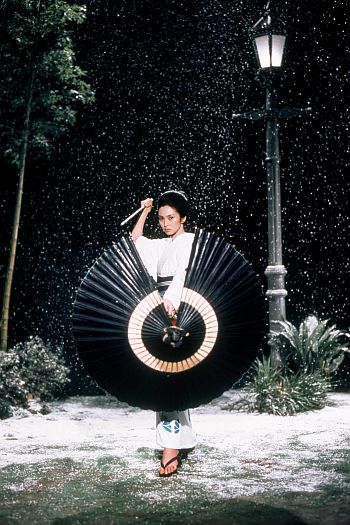 I’ll be honest: I was disappointed. I’d been looking forward to seeing this for a long while, but when we finally cranked it up on Monday, found it pretty dull. Truth be told, Chris was giving it loud Z’s by the end of the film, and I spent a few minutes closing my eyes and just listening to the dialogue. Which, since it was in Japanese, isn’t a good sign either. This was a surprise. A lot of people, whose views I generally respect, really like it, such as
I’ll be honest: I was disappointed. I’d been looking forward to seeing this for a long while, but when we finally cranked it up on Monday, found it pretty dull. Truth be told, Chris was giving it loud Z’s by the end of the film, and I spent a few minutes closing my eyes and just listening to the dialogue. Which, since it was in Japanese, isn’t a good sign either. This was a surprise. A lot of people, whose views I generally respect, really like it, such as 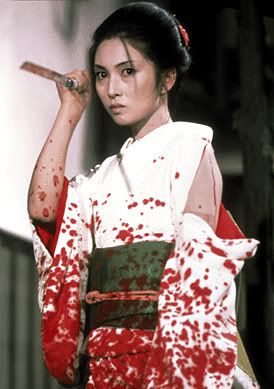 Then there’s the action, which is second-rate at best. It may have seemed cutting-edge when the film was released in 1973. Approaching forty years later… Not so much. There’s little sense that anyone – good or bad – has true sword skills, and the battles are largely brief and perfunctory. Admittedly, the arterial spray is enthusiastic – clearly the high blood-pressure epidemic affecting Japan is not a new phenomena – and looks very pretty on the snow backdrop which is frequently used. However, that can only go some way to overcoming the flaws in the characterization: one suspects the original manga, by Kazuo Koike (who also did Lone Wolf and Cub), perhaps had more room to be better developed in this area. And while we’re at it, what’s with the anachronistic jazz soundtrack, dating from a good half-century after this is set? Any sense of period atmosphere is completely destroyed, every time it cranks up.
Then there’s the action, which is second-rate at best. It may have seemed cutting-edge when the film was released in 1973. Approaching forty years later… Not so much. There’s little sense that anyone – good or bad – has true sword skills, and the battles are largely brief and perfunctory. Admittedly, the arterial spray is enthusiastic – clearly the high blood-pressure epidemic affecting Japan is not a new phenomena – and looks very pretty on the snow backdrop which is frequently used. However, that can only go some way to overcoming the flaws in the characterization: one suspects the original manga, by Kazuo Koike (who also did Lone Wolf and Cub), perhaps had more room to be better developed in this area. And while we’re at it, what’s with the anachronistic jazz soundtrack, dating from a good half-century after this is set? Any sense of period atmosphere is completely destroyed, every time it cranks up.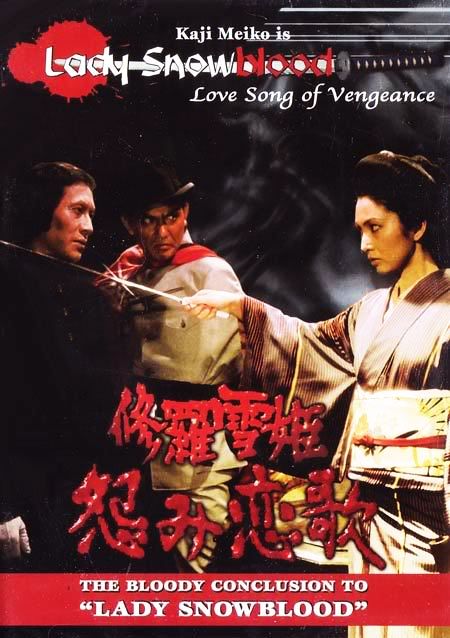 I was hoping that the second film would show me why this series has such a solid reputation, but was even more disappointed by the sequel than the original. There’s a striking opening, where Yuki basically walks out of an ambush, hardly bothering even to pay attention to the men circling her – except to slaughter them. Unfortunately, it’s pretty much downhill from there, with proceedings getting badly bogged down in even more of the political shenanigans that we saw in part one. Yuki is arrested and sentenced to death for her 37(!) murders, but is rescued by the chief of the secret police, Kikui Seishiro (Kishida), who sends her on a mission against nihilist Ransui Tokunaga (Itami), perceived as a threat to the order of things.
I was hoping that the second film would show me why this series has such a solid reputation, but was even more disappointed by the sequel than the original. There’s a striking opening, where Yuki basically walks out of an ambush, hardly bothering even to pay attention to the men circling her – except to slaughter them. Unfortunately, it’s pretty much downhill from there, with proceedings getting badly bogged down in even more of the political shenanigans that we saw in part one. Yuki is arrested and sentenced to death for her 37(!) murders, but is rescued by the chief of the secret police, Kikui Seishiro (Kishida), who sends her on a mission against nihilist Ransui Tokunaga (Itami), perceived as a threat to the order of things.